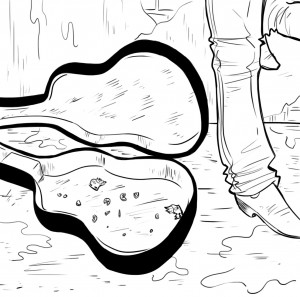The other day I had an epiphany: To the average music consumer, a song is worth less than a candy bar. It might last longer, sound sweeter, and offer a more meaningful experience, but don’t ask us to spend more than $1 on it.

In fact, we’d prefer you didn’t ask us to spend any money at all. That’s why we loved Napster, that’s why we loved Pandora, and that’s why we love Spotify.
Early last summer the popular European digital music service Spotify came to the United States with much blog buzz and fanfare. Boasting a catalog of over 15 million songs, Spotify offers free streaming access to its entire library through any laptop or mobile device. It’s ad supported, but subscribers willing to shell out $10 a month can enjoy their playlists without the interruption of advertisements. Not a bad deal for music fans. And at first glance, it’s not a bad deal for musicians either. The artist is paid royalties on a per play basis. Everybody wins, right? Not really.
Many of us like to celebrate the apparent demise of the big, bad record companies as a justification for this behavior. We like to say that their business model is outdated and now they’re paying the price. Good riddance, we say. Greedy bastards! But guess what? We’ve been singing that tune for over a decade, and those greedy record companies are still here. Sure, they’re wounded. So they consolidate. They drop artists from their roster. They stop developing young acts. They stop signing new bands. They stop taking risks on anything different or exciting. They dump all their money into the tiny handful of top-grossing acts that keep the label afloat, like Lady Gaga and Metallica. When they do sign anyone, they sign safe bets like American Idol contestants and YouTube child sensations.
The unknown bands are left floundering in cyberspace, hoping in vain that they can amass enough Facebook fans to entice industry folk and get noticed. If they’re smart, they tour. But touring is expensive, and since their records aren’t selling well at gigs, they have trouble keeping the van gassed up. Unless they’ve been blessed with an angel investor or rich parents, life on the road isn’t financially sustainable. So they figure the Internet is the way to go. Them and about 15 million others. They try to get some blog attention. Maybe Pitchfork will pick them up as the flavor of the month. But then what? I still don’t have any friends who listen to The Weeknd. Bands don’t break through blogs.
Point is, it’s hard out there for the little guys, the unknowns. And let’s be honest, the trickle-down devaluation of music hasn’t been much better for audiences than it has for bands. Sure we save a couple dollars, but the culture of one-hit-wonders, reality star divas, and the general cycle of crap that gets churned out by the pop culture machine has only worsened, thanks to musical Reaganomics. They say the customer is always right, but when the customer stops valuing the product, why bother investing in its production? Innovation dies in favor of the fast, the cheap and the guaranteed.
So pay for your music, boys and girls. Support the good stuff that’s out there, and skip services like Spotify. We can’t afford to live off candy bars forever.






